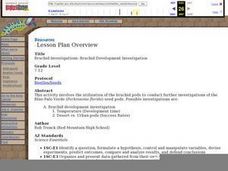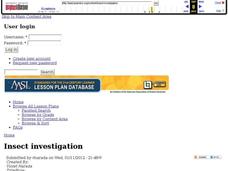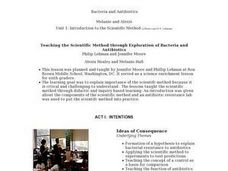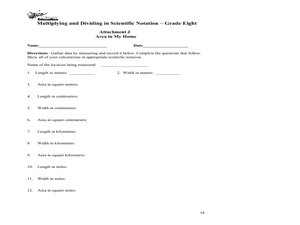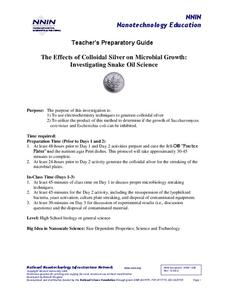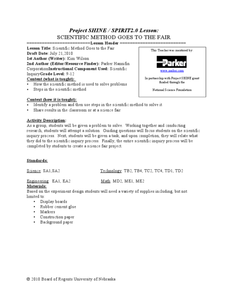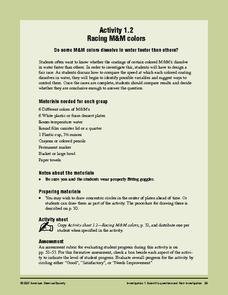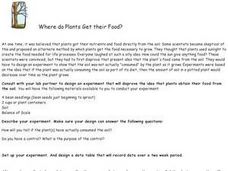ResourcesWeb & Docs
MediaVideo & Audio
CollectionsLessons & Topics
AI Teacher ToolsInstruction & Ideas
newFilter
1,522 results:
scientific investigationClear All
Curated OER
Investigate Science Using Crayfish
Young scientists discover the importance of scientific investigation by observing live crayfish. They carefully observe the patterns of crayfish in different environments. Then they discuss their conclusions and define what all living...
Curated OER
Bruchid Investigations: Bruchid Development Investigations
While this lesson plan is based on the Bruchid beetle, the focus is on conducting a scientific investigation. Ecology explorers vary the temperature or the type of leaf that Bruchid eggs are laid on and test for effects on the...
Curated OER
Insect Investigation
Investigation is a brilliant way to spark scientific inquiry. First graders will identify, research, and report what they have learned about a mysterious bug found on the playground. They will use multimedia resources for research and...
Curated OER
Teaching the Scientific Method through Exploration of Bacteria and Antibiotics
Students explore scientific method and scientific investigation They conduct an investigation using bacteria and antibiotics. In addition, they verbalize their experimental results.
NASA
The Discovery of Jupiter Radio Waves
Lead your class on a journey to the planet Jupiter and provide them with fun facts in the process. Learners explore radio waves emitted by Jupiter to further understand how this data helps our daily lives. They conclude by discussing...
Mathematics Assessment Project
Estimating Length Using Scientific Notation
Would you rather have a million dollars or 1 x 10^6 dollars? To find the answer to this question, class members first complete an assessment task converting numbers between decimal notation and scientific notation. They then take...
Perkins School for the Blind
Introduction to Scientific Inquiry
Every great scientist knows that the process of inquiry is a very important skill. Provide your learners with visual impairments with an opportunity to explore objects scientifically. They examine several pieces of fruit and generate...
Curated OER
Designing An Investigation
Young scholars will design a scientific investigation. In this engineering design lesson, students will set up an investigation, collect data and form a conclusion about bridge design. They will use common household items to construct...
NASA
Let's Investigate Mars
Take your science class on a hypothetical field trip to Mars with an engaging astronomy lesson. After first learning about NASA's Mars rover missions, young scientists plan their own scientific investigations of Earth's...
College Board
AP Physics 1 and 2 Inquiry-Based Lab Investigations
Have you ever wondered what type of AP Physics investigations The College Board wants? This is the guide for you! Sixteen labs covering both Physics I and II will get you started and inspire you to meet the requirement of 25 percent of...
Ohio Department of Education
Multiplying and Dividing in Scientific Notation - Grade 8
Here is really nice set of resources on scientific notation. Eighth and ninth graders explore the concept of multiplying and dividing in scientific notation. In this multiplying and dividing numbers in scientific notation...
Curated OER
Scientific Method: How Many Drops of Water Fit on a Coin?
Young investigators conduct an experiment using the scientific method. They see how many drops of water fit on a coin; have them conduct several different trials. This involves making a hypothesis, looking at controls, and introducing...
National Nanotechnology Infrastructure Network
The Effects of Colloidal Silver on Microbial Growth: Investigating Snake Oil Science
Can your classes solve the problem of the smelly sweat sock? Young scientists complete a lab investigation that begins by using electrochemistry to generate colloidal silver. They use their solutions to test the rate of microbial growth...
Curated OER
How Do We Use Scientific Inquiry To Solve the World's Problems?
Ninth graders examine how a scientific investigation is performed. They read and discuss examples of various scientific experiments, design an experiment involving fast growing plants, and create graphs and charts to present their...
Curated OER
Skin Cancer Investigation: A Multi-Component Project
Students compare the perceived and actual risks of getting skin cancer, while looking at ways to minimize these risks. They may have very little grasp of the severity of the threat of skin cancer or be unaware of the increase in the...
Curated OER
Scientific Method Goes to the Fair
Students use scientific process skills to solve a problem. In this scientific investigation lesson, students investigate a scientific problem, work through the scientific method to form a conclusion. They share their work and findings...
Curated OER
Investigating Brass Instruments and Pitch
Young scholars observe the sounds of different brass instruments in order to understand how to create different pitches. In this musical instructional activity, students create a "brass" instrument from everyday household objects. The...
Curated OER
Student Designed Investigations Part 3 – Collecting Data and Drawing Conclusions
Students explore how living things adapt to their environment. For this science lesson, students conduct scientific investigations to examine animal adaptations.
American Chemical Society
Racing M&M Colors
More than anything, this is great practice in scientific inquiry. After discovering that the color coating of an M&M® dissolves in water during a preceding activity, investigators now question whether or not the color makes a...
Cornell Lab of Ornithology
Investigating Evidence
Explore the scientific process through nature. Scholars become scientists as they develop a question, design an experiment, collect data, and analyze their results. A two-week lesson guides your classes through the process and provides...
Curated OER
Where Do Plants Get Their Food?
Plants need food to survive, just like any other living organism. Young biologists analyze an experiment performed in 1610 by Jan van Helmont to determine if plant nutrition is obtained through the soil. First, lab groups work together...
Curated OER
Designing Experiments - Overview
Students explore the concepts that enable them to design and conduct sound scientific experiments. They critique a faulty experiment and become familiar with some of the criteria of a good experiment. They conduct their own experiment.
Curated OER
Ornithology and Real World Science
Double click that mouse because you just found an amazing lesson! This cross-curricular Ornithology lesson incorporates literature, writing, reading informational text, data collection, scientific inquiry, Internet research, art, and...
Curated OER
Catapults
Young scholars test catapults. In this physics lesson, student conduct scientific investigations that require them to test catapults. Students practice their problem solving skills as they employ the use of the scientific method.



